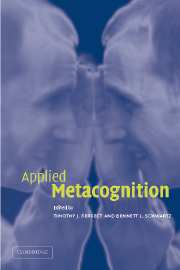Book contents
- Frontmatter
- Contents
- List of contributors
- Preface
- 1 Introduction: toward an applied metacognition
- Part 1 Metacognition in learning and education
- 2 The relation between metacognitive monitoring and control
- 3 Metacognition for text: findings and implications for education
- 4 Influence of practice tests on the accuracy of predicting memory performance for paired associates, sentences, and text material
- Part 2 Metacognition in everyday memory
- Part 3 Metacognition in different populations
- References
3 - Metacognition for text: findings and implications for education
Published online by Cambridge University Press: 22 September 2009
- Frontmatter
- Contents
- List of contributors
- Preface
- 1 Introduction: toward an applied metacognition
- Part 1 Metacognition in learning and education
- 2 The relation between metacognitive monitoring and control
- 3 Metacognition for text: findings and implications for education
- 4 Influence of practice tests on the accuracy of predicting memory performance for paired associates, sentences, and text material
- Part 2 Metacognition in everyday memory
- Part 3 Metacognition in different populations
- References
Summary
Reading and learning from text is a fundamental part of the life of college students. More than likely, a student's academic welfare will depend on how well he or she retains information from reading. One aspect of reading that has become the focus of study for cognitive psychologists and educators alike is self-assessment of comprehension. Assessing or monitoring of reading falls under the category of metacognition (Flavell, 1979), a person's cognitions about their own cognitive phenomena. For text material, metacognition includes judgments about levels of comprehension and learning of the text, and predictions about future memory for the material. Because of the importance of comprehension in learning from text, Maki and Berry (1984) used the term metacomprehension to refer to metacognition involving text material. We will use the terms metacomprehension and metacognition for text synonymously in this chapter.
Metacomprehension ability should be important for a college student's academic success. The first theme of this chapter is the relevance of theoretically motivated research to classroom settings because it is in classroom settings that students must use their abilities to judge learning from text material. We will describe studies that have been conducted in classroom settings and then discuss differences between these studies and those conducted in the laboratory. To preview our discussion, we will show that studies in classroom settings have differed from laboratory studies in many ways. We suggest that the major reason for different conclusions is the use of different measures of metacomprehension in the two settings.
- Type
- Chapter
- Information
- Applied Metacognition , pp. 39 - 67Publisher: Cambridge University PressPrint publication year: 2002
References
- 22
- Cited by



